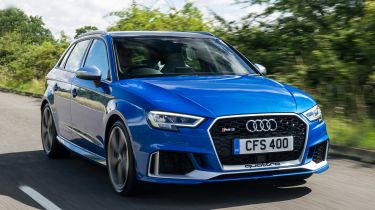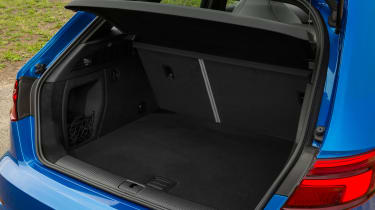Audi RS 3 (2017-2021) review - Reliability and safety
Audi gets great reliability and build quality scores in our Driver Power survey, plus it looks good in crash tests

Audi is famed for the quality of its components, and the RS 3 should be no different. We used the launch control several times back-to-back in our test, and the gearbox felt like it was happy to do it all day.
Because the RS 3 is based on the VW Group’s modular MQB platform (which saves 55kg compared to its predecessor), it uses a large number of common components already proven throughout the VW, Audi, Skoda and SEAT ranges.
But that hasn’t prevented the A3 turning in a below-average performance in our 2019 Driver Power satisfaction survey, with the third-generation model (on which the RS 3 is based) coming in 69th overall out of 75 new cars. Audi fared slightly better in the manufacturer poll, taking 16th place out of 30 brands, but in the latest 2020 ratings fell back to 21st position.
If you plan to use your RS 3 on track (which we wouldn’t particularly recommend, but might prove hard to resist), or to frequently drive it hard, then it might be worth ordering the optional carbon-ceramic brakes for their longer lifespan and fade-free stopping power. However, it's likely the front tyres will be torn to shreds long before the standard cast iron discs start to wilt.
Used - available now
The Audi A3 three-door hatchback which is identical to the Sportback in most meaningful ways, scored a full five-star rating in the Euro NCAP crash tests, including an excellent 95 per cent for adult occupant safety and 87 per cent for child safety.
There's a whole raft of safety systems available to help prevent accidents, including a lane departure warning system, adaptive cruise control and a 'pre-sense' program that tightens up the seat belts and closes the windows if the car enters a skid. The downside is that some of the more advanced tech is on the options list.
Warranty
The RS 3 comes with Audi’s regular three-year/60,000 mile warranty, but you can extend it to four years/75,000 miles or five years/90,000 miles for £245 or £545. The Mercedes-AMG A45 has a three-year warranty, but with the significant added reassurance of unlimited mileage.
Servicing
Audi’s flexible service regime for high-mileage drivers could mean you only need an oil change every two years or 19,000 miles. An oil condition sensor on the car determines the service interval for you.
If you do less than 10,000 miles a year Audi recommends an annual oil change with a full inspection service at two years/19,000 miles.












